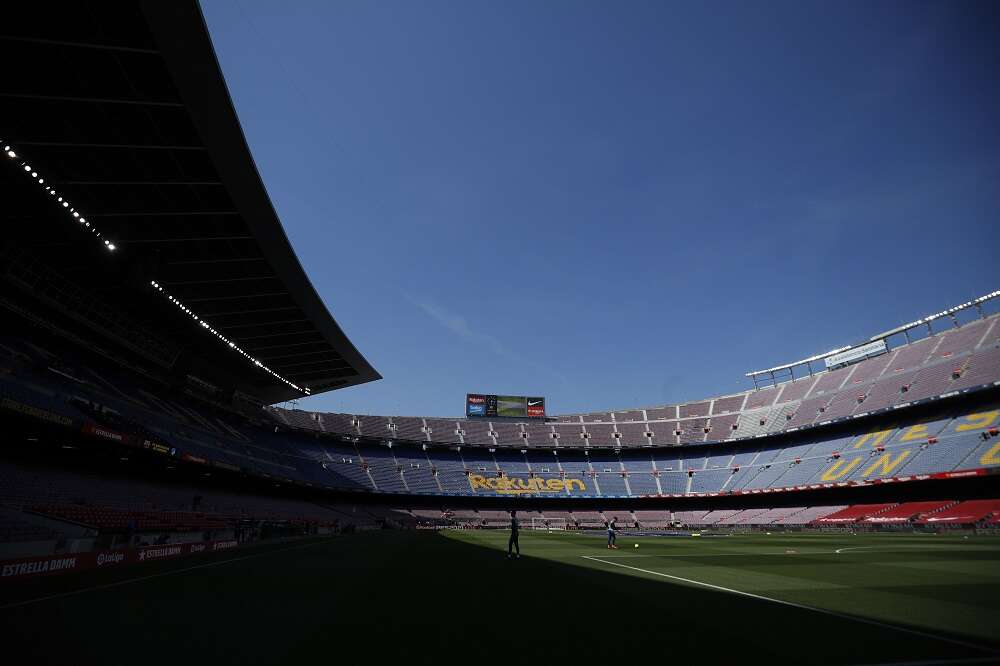
By Nathan Allen and Aishwarya Nair
MADRID (Reuters) -Spain’s top soccer clubs including Real Madrid and Barcelona would get lucrative cash infusions under a proposed 2.7 billion euros ($3.2 billion) deal between the country’s top league and a private equity firm.
Local media reports initially suggested the injection could help Barca resolve star forward Lionel Messi’s contract situation, while it was also mooted that the cash could prove pivotal in Real’s reported pursuit of Paris St Germain’s Kylian Mbappe.
However La Liga said clubs would be obliged to use 70% of the money they receive on infrastructure improvements, such as technology. A maximum of 15% can be used on player acquisition and a further 15% to finance debts.
In a statement on Wednesday La Liga said it had agreed in principle a “multipronged” deal with CVC including the 2.7 billion euros infusion in return for 10% of its revenue, as well as the creation of a newly formed company housing a range of commercial activities in which CVC would also take a 10% stake.
The Spanish football league’s Executive Committee later approved the plan, dubbed “Boost La Liga” (La Liga Impulso), and it will now be voted on by all league members at a General Assembly on a date to be set.
The deal values La Liga at around 24.25 billion euros in total and, if approved by clubs, will fund what it called “structural improvements” while offsetting some of the immediate impact from COVID-19, the league said in a statement.
La Liga said the cash injection – 90% of which will go to clubs – would be distributed on the basis of a formula derived from average audiovisual revenues over the last seven years, when La Liga started commercializing rights as a collective – implying the top two would get the biggest chunks.
Barca declined to comment when contacted by Reuters about the deal. Real did not immediately respond to request for comment.
CVC was part of a consortium last year which entered talks to buy a stake in the media business of Italy’s top soccer league, but the deal fell through following objections from some clubs.
ALTERNATIVE SOURCES
Faced with the end of a cycle of rapid growth in the value of TV rights – and pummeled by a year of next to zero ticket sales due to restrictions on crowds – soccer leagues and clubs not just in Spain are scrambling to find alternative sources of revenue.
The failure of an attempt earlier this year by 12 of Europe’s biggest clubs to set up a breakaway Super League ratcheted up pressure on the top clubs.
Under the terms of the deal, La Liga would set up a new company to house commercial elements, such as sponsorship deals, the league’s technology arm La Liga Tech and their joint U.S. venture – including plans to stage a league match in the United States – in which CVC would take a tenth.
It didn’t say what structural improvements it envisaged but these could include stadium and training facilities.
Management of the league’s sporting responsibilities and its audiovisual rights business would remain outside the scope of the transaction, La Liga said. “When it comes to the rights strategy and sales, this will continue to be handled by La Liga,” a spokesperson said.
With the boost from the investment, the Spanish league hopes to match or exceed the English Premier League’s business in the next six to seven years, a source close to La Liga added.
For CVC, which used to own Formula One, the deal would add to its interests in sport. It agreed in March to invest 365 million pounds for a share in rugby union’s Six Nations tournament, grouping France, Ireland, England, Scotland, Wales and Italy.
($1 = 0.8435 euros)
(Editing by Jason Neely and David Holmes)


